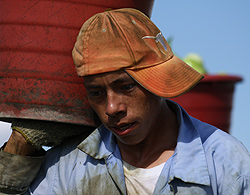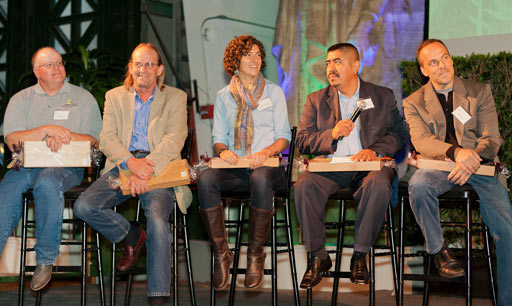Gerardo Reyes of the CIW comments on the new WK Kellogg Foundation poll
Plus… Check out the CIW’s comments at last week’s Natural Resources Defense Council Food Justice Award Ceremony!
This week, hundreds of representatives of community organizations, national coalitions, advocacy groups, authors, and activists from across the national food movement gathered in Asheville, North Carolina for the annual W.K. Kellogg Foundation’s Food and Community Conference. As part of the kick-off to the 2012 conference, Kellogg released the findings of a nationwide poll of consumer sentiment around several of the key demands of the growing food justice movement.
As reported in a Washington Post article on the poll, the results were “striking”. The Post article cited as particularly “surprising” the strong consumer support for fair wages for farmworkers, even when the question is posed in such a way that the wage increase is paid for by an increase in produce prices to the consumer. Here’s the excerpt:
| “… The Kellogg survey of 800 American adults unearthed some other, arguably, surprising statistics about the country’s attitudes about fresh fruits and vegetables — and the people who harvest them. Approximately 88 percent of respondents would strongly or partly agree to pay $1.50 more per month if it guaranteed that farm workers would be paid a fair wage.” read more |
88 percent. At first blush, that is surprising. There are very few issues in this country today on which 88% of the people agree, not to mention an issue considered to be as unpopular as higher prices at the cash register to help farmworkers escape from poverty (in the midst of a recession, no less).
 But the results — while certainly an encouraging objective measure of support for the core principle of the Fair Food movement — are hardly surprising to us. CIW members and Fair Food allies do informal “focus group” discussions with American consumers from across the spectrum every day, every week, every month of the year, and the results are very similar to the Kellogg poll findings. Rare is the person who — after learning of the poverty and degradation behind the rows of beautiful, healthy, colorful fruits and vegetables in their produce aisles, and of the relatively minimal price increase necessary to alleviate that poverty — rejects the call for a penny more per pound to win a measure of justice for Florida tomato harvesters.
But the results — while certainly an encouraging objective measure of support for the core principle of the Fair Food movement — are hardly surprising to us. CIW members and Fair Food allies do informal “focus group” discussions with American consumers from across the spectrum every day, every week, every month of the year, and the results are very similar to the Kellogg poll findings. Rare is the person who — after learning of the poverty and degradation behind the rows of beautiful, healthy, colorful fruits and vegetables in their produce aisles, and of the relatively minimal price increase necessary to alleviate that poverty — rejects the call for a penny more per pound to win a measure of justice for Florida tomato harvesters.
The vast majority of consumers participate unquestioningly in the food system as it is today only because they do so from a basis of incomplete information. When they learn the story of farm labor exploitation behind their food, they almost inevitably make different choices, exercising their voice and their purchasing power as consumers to change that story. The Washington Post story concurs:
| “… These findings would appear to underscore the success of various organizations, progressive school districts, environmentalists, activist chefs, good food advocates and writers, and first lady Michelle Obama’s Let’s Move! campaign in spreading the gospel about local produce, fresh fruits and vegetables and more healthful diets. The message is clearly sinking in with the American public. ” read more |
So, check out the Post report, and watch the CIW’s own Gerardo Reyes (above), as he is asked for his reaction to the exciting poll results at this week’s Kellogg conference in North Carolina.
NRDC Food Justice Award

Last week we promised to provide a little more color from the exciting ceremony in San Francisco last Wednesday when the Natural Resources Defense Council awarded its first-ever Food Justice Award to Greg Asbed and Lucas Benitez (first and second from right, respectively) of the CIW. So, here below are Lucas’ and Greg’s comments (brief as they were) from the event (for some context, the comments came in response to an interesting quiz-show format question and answer session with the crowd and the award recipients, with the question on farm labor concerning the legal rights exemptions for farmworkers):
| Lucas Benitez:
“The country’s system of legal rights and enforcement of those rights has failed farmworkers for centuries. That is why we have set out to build a human rights alternative in Immokalee today, one that benefits both workers and the food industry as a whole in building a stronger, more sustainble industry for the future. The Fair Food Program is designed to defend and advance farmworkers’ human rights in Florida’s tomato fields, and it is based on four key elements that work together like the four legs of a table:
That is what we are building in Florida — complaint by complaint, education session by education session — today.” |
| Greg Asbed:
“But we want to make one thing very clear: This is by no means the Fair Food Program’s “Mission Accomplished” moment. It is still far too early declare victory. Victory doesn’t come when you develop a new code of conduct or set of standards. Victory doesn’t come when you convince retailers to adopt your code. Victory doesn’t come when growers agree to implement your code. Victory doesn’t even come when a worker is sexually harassed, she finds the strength within herself to complain, her complaint is investigated, a finding is issued, and the harasser is fired on the spot, or, failing that, the grower refuses to comply with the finding and loses business to growers who are complying with the program. Victory only comes when that result happens over, and over, and over again — consistently and sustainably — until the harassment stops. We are not there yet, but with your continued support, and with your action in the campaign to bring the supermarket industry into the Fair Food Program, we will get there. |
Stay tuned, as always, for much more to come from the Campaign for Fair Food!
